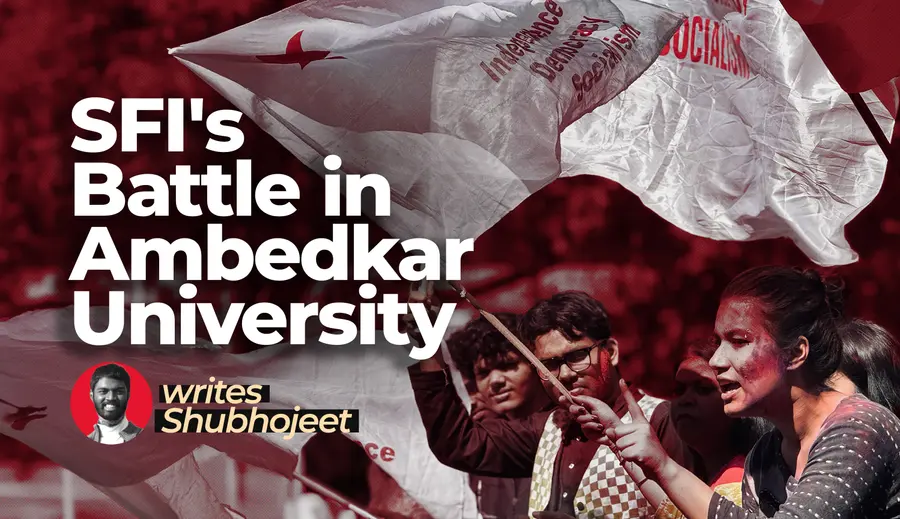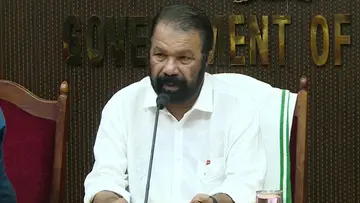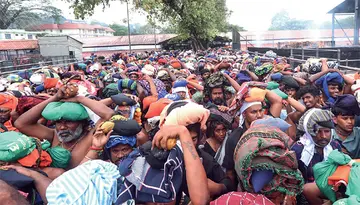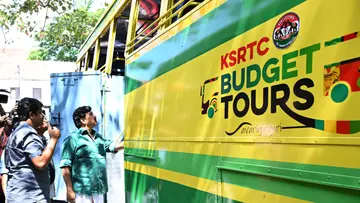Student Resistence
Barricades and Baton Charges: A Campus Uprising at AUD

Shubhojeet Dey
Published on Apr 17, 2025, 06:25 PM | 5 min read
On April 11, students at Ambedkar University Delhi (AUD) faced an intense crackdown by
the university administration. As we attempted to seek an urgent meeting with the
Vice-Chancellor—after a fellow student on hunger strike fainted in the scorching Delhi
heat—we were met with violence. I was held by the throat with a baton, and saw women
students being physically assaulted and harassed by the security guards. As the university
gates were hastily opened to allow the Registrar and Vice-Chancellor to leave in their
vehicles, one of the cars nearly hit a student.
These events were the culmination of an ongoing struggle, not rooted in disruption, but in
students’ efforts to seek accountability from the administration. Our only demand was an
audience with the Vice-Chancellor after a fellow student collapsed during a peaceful
hunger strike. Instead, we were met with force and were later suspended, without any
formal inquiry.
The background of this conflict stretches back to March 5, when the Students’ Federation
of India (SFI) won the student union elections, defeating both the right-wing ABVP and other student unions including the left. These were the first elections held at AUD in six years and the results reflected a faith in SFI and its political commitment. Shortly after the victory, three of our leading activists—Anan Bijo, Nadia, and Harsh Chaudhary—were suspended. The reason cited was “tarnishing the name of the university.”
Their suspension came despite the fact that they had brought to light a serious case of
ragging. In late February, while fully engaged in election campaigning, the three had
intervened in a horrific situation: a girl student was being mentally harassed by eight ABVP activists and their sympathisers. The harassment was severe enough to cause suicidal ideation. Fortunately, her mother reached out to SFI, and the student was helped before any harm occurred.
SFI responded immediately—informing the student community and demanding that the
administration investigate. Anan, Nadia, and Harsh were at the forefront of these efforts. It was on the day of SFI’s election win that they received their suspension letters. Over the following weeks, the administration’s actions appeared increasingly inconsistent. While the three SFI members were suspended for “spreading falsehoods,” the sameadministration also suspended the eight students accused of harassment—implying that the case was serious.
However, within two weeks, those eight were reinstated. In contrast, the three activists were not even granted a hearing with the Proctor. Central to this pattern is the role of Proctor Satyaketu Sankrit. Appointed in 2019, Sankrit has long standing links to the Rashtriya Swayamsevak Sangh (RSS) and now holds multiple
influential positions in the university. In the past, he had been issued a show-cause notice for attempting to organise religious events on campus—an action deemed inappropriate in AUD’s secular, public character. SFI has previously challenged his actions, whether it be censorship of film screenings or lack of response to campus incidents. The bias against SFI has become increasingly evident.
By the end of March, with no progress through formal appeals, we decided to intensify our campaign. We approached the Delhi High Court and simultaneously continued peaceful protests on campus, despite newly placed barricades designed to limit student movement. On April 7, we began a sit-in protest. Two days later, a hunger strike was initiated. Our demands were straightforward: revoke the suspensions and remove the barricades inside campus to allow free movement.
On April 11, the third day of the hunger strike, a student collapsed due to the heat and prolonged fasting. The Student Union had already sent a formal request to meet the Vice-Chancellor earlier that day. We updated her office again after the student’s collapse but received no response. With the administrative block sealed off by barricades, five of us waited near the university’s main gate hoping to speak with the Vice-Chancellor as she left. We had no intention of obstructing or confronting her—only to gain a brief audience. Despite this, we were met with physical assault. Security guards used force on us—two men
and three women students. The women were subjected to serious physical aggression, including sexual harassment. The Vice-Chancellor and Registrar left without addressing us, and police on the scene did not intervene.
Later that day, we were suspended indefinitely. The accusation: “assaulting the
Vice-Chancellor and Registrar.”
The events of April 11 sparked a significant response from the student body. Videos of the
violence circulated widely. Many students, despite fears of reprisals, came out in open
support. The media took notice. On April 14, during the university’s Ambedkar Memorial
Lecture, students entered with placards and called for justice. On April 15, a large “March
for Justice” was held on campus, drawing significant participation. The same day, the DelhiHigh Court revoked the suspensions of Anan, Nadia, and Harsh—a major victory that reinforced students’ belief in challenging unjust authority.
A university-level strike is now being planned for April 21.This movement began with the simple goal of supporting a victim of ragging—an issue many had assumed no longer existed in universities. But the response from the administration revealed deeper problems of suppression and institutional bias. We continue to stand by our principles, Independence, Democracy and Socialism. We are proud to be part of an organisation that spoke up when others remained silent. The struggle is on and we will not take an inch back!










0 comments